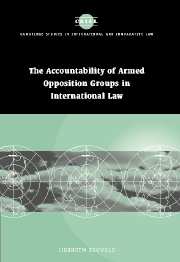Conclusion
Published online by Cambridge University Press: 28 July 2009
Summary
The provisions of international humanitarian law, international criminal law, and international human rights law are each aimed at different actors. For example, international humanitarian law binds parties to an internal conflict, such as the state and armed opposition groups as a collectivity. International criminal law penalizes particular acts of individuals. In addition, it often obliges the state to prosecute persons for committing these criminalized acts. The provisions of human rights law apply primarily to the state. Each of these three actors – namely armed opposition groups as such, the individual members and leaders of these groups, and the state – may incur international accountability for acts committed by armed opposition groups in internal armed conflicts. Practice of international bodies reveals the following trends as regards the accountability of these actors.
International practice shows that armed opposition groups themselves can be held accountable under international humanitarian law. In order to be held accountable, such groups must at least be organized and engage in military operations. Once armed opposition groups accede to government, the principle of state responsibility applies. At the same time, the international accountability of armed opposition groups is primitive and the prospects for further development are limited. One reason is that there are no supervisory mechanisms set up for the express purpose of monitoring the behaviour of armed opposition groups.
International humanitarian law applicable to armed opposition groups increasingly encompasses humanitarian law originally only applicable to states in international conflicts.
- Type
- Chapter
- Information
- Accountability of Armed Opposition Groups in International Law , pp. 229 - 230Publisher: Cambridge University PressPrint publication year: 2002

